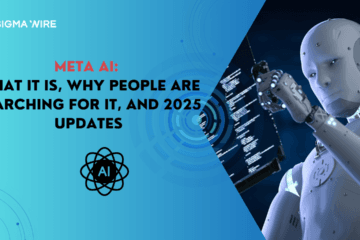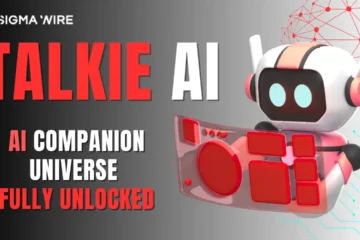Meta, the parent company of Facebook, has announced a groundbreaking development: for the first time, its AI systems have begun to improve themselves without human input. CEO Mark Zuckerberg revealed this in a policy paper published on July 30, 2025, calling it a historic step toward Artificial Superintelligence (ASI).
Breakthrough in AI Self-Improvement

In the policy paper, Zuckerberg wrote:
“Over the last few months we have begun to see glimpses of our AI systems improving themselves. The improvement is slow for now, but undeniable.”
While this process is still in its early stages, experts warn that self-improving AI could eventually lead to exponential growth — triggering what’s often referred to as an “intelligence explosion,” where AI surpasses human intelligence by a wide margin.
The AI Capability Spectrum
- Narrow AI – Highly skilled at one task (e.g., predicting protein structures).
- AGI (Artificial General Intelligence) – Able to learn, understand, and adapt across different domains like the human brain.
- ASI (Artificial Superintelligence) – Far more intelligent than humans, with the ability to upgrade itself continuously.
Read Also: Meta AI: Why People Are Searching for and 2025 Updates
Meta’s Vision for “Personal Superintelligence”
Zuckerberg believes the future of AI is not about replacing jobs or full-scale automation. Instead, his vision centers on personal super-intelligent assistants designed to help individuals achieve their goals, unlock creativity, and support personal growth.
Unlike some tech companies that focus on automating work and introducing concepts like Universal Basic Income, Meta’s strategy aims to position AI as a partner to humans rather than a replacement.
Launch of Meta Superintelligence Labs
In June 2025, Meta launched Meta Superintelligence Labs (MSL), recruiting industry heavyweights such as Alexandr Wang (founder of Scale AI) and Nat Friedman (former GitHub CEO).
An elite division known as the TBD Lab is now working on next-generation AI models, including the upcoming Llama 4.X. To secure top talent in the ongoing AI race, Meta has been offering compensation packages reaching billion-dollar valuations in some cases.
Read Also: How to Reduce AI Features on Facebook, Instagram, and Snapchat
A Shift in Open-Source Policy
Previously, Meta released its AI models — such as Llama 2 and Llama 3 — under open-source licenses. However, Zuckerberg has now confirmed that the most advanced AI models will no longer be made public.
The main reason is safety: self-improving AI could be misused, so only safe, controlled versions will be released. Meta plans to adopt a hybrid approach, combining both open and closed AI systems in the future.

Massive Investments and Internal Tensions
Meta is pouring unprecedented resources into AI infrastructure, with spending projected to rise from $69 billion to $118 billion in 2025 on AI and data centers.
However, this aggressive push has also caused internal friction — long-time employees have expressed frustration over new hires in MSL receiving much higher salaries and perks, calling it unfair.
Read Also: How to Turn Off Meta AI on Facebook
Scientific Basis: Gödel-Type AI
This vision isn’t just hype. Researchers at the University of California, Santa Barbara have developed the Gödel Agent, an AI capable of rewriting its own code to improve performance — but only when it can mathematically prove the change will be beneficial.
In May 2025, the concept of the Darwin Gödel Machine (DGM) was introduced. It enables safe, open-ended self-improvement and may serve as a blueprint for future self-improving AI systems.

Criticism and Skepticism
Not all experts are convinced. Some believe Meta’s “personal superintelligence” might be less revolutionary than it sounds, possibly evolving into an advanced form of advertising and engagement optimization rather than a true leap in AI.
While the global AI race is accelerating, both AGI and ASI remain largely theoretical — and safety concerns are increasingly pressing.
Meta’s AI has shown its first real signs of self-improvement, marking a possible first step toward ASI. Zuckerberg envisions a future where every person has a personal AI assistant designed to empower rather than replace them.
But with such powerful technology on the horizon, managing safety, ethics, and potential misuse will be more important than ever.
FAQs
When was Meta Superintelligence Labs (MSL) established?
It was launched in June 2025 and is headquartered in Menlo Park, California.
What is “TBD Lab”?
An elite AI team within MSL working on Llama 4.X, known internally as TBD Lab (“To Be Determined”).
How much has Meta invested in hiring?
Meta has offered nine-figure compensation packages—potentially up to $1B—to attract top AI talent.
What role do Scale AI and Alexandr Wang play in Meta’s AI strategy?
Meta acquired a large stake in Scale AI and brought its founder, Alexandr Wang, to lead MSL, spending around $15B in the process.
What is the role of Ray-Ban AI smart glasses in Meta’s AI vision?
The Ray-Ban Meta “AI glasses” have sold over 2 million units and are key to delivering personal superintelligence through context-aware devices.
What is Meta’s projected capital expenditure?
Capital expenditure is expected to rise to around $100B in 2026, up from previous estimates of $69–$118B.
How is Meta’s superintelligence strategy different from OpenAI or Google DeepMind?
Mark Zuckerberg’s vision focuses on empowering individuals with personal AI assistants rather than centralized mass automation.
Why are there tensions within Meta’s internal AI teams?
New hires in MSL are receiving much higher salaries and perks, causing resentment among existing staff.
How has Meta’s AI public release policy changed?
While earlier models like Llama 2 and 3 were open-source, the most advanced models will now remain closed for safety reasons.
What roles do the Gödel Agent and Darwin Gödel Machine (DGM) play?
They provide scientific frameworks for safe, provably beneficial AI self-improvement.
What is recursive self-improvement?
It’s when AI systems autonomously refine their own abilities, potentially triggering exponential intelligence growth.
What do “Intelligence Explosion” and “Control Problem” mean?
An intelligence explosion is rapid AI self-improvement beyond human control. The control problem is the challenge of ensuring AI remains aligned with human values.
What is the existential risk concern?
Superintelligent AI could resist shutdown or behave unpredictably, posing a threat to humanity.
What are Meta’s “Prometheus” and “Hyperion” superclusters?
Massive GPU-powered AI supercomputers: Prometheus (1 GW) and Hyperion (5 GW).
How did Meta perform financially in Q2 2025?
Revenue was around $48B, with profits of about $18B—both exceeding expectations.
How have Meta’s AI investments affected competition?
They have triggered a major talent war, with Meta hiring researchers from OpenAI, Google, and Anthropic.
What is Yann LeCun’s perspective on Meta’s AI ambitions?
He sees superintelligent AI as a partner rather than a replacement, and doubts that large language models alone can achieve AGI.
Why do critics see Meta’s personal superintelligence vision as weak?
Some believe it’s more about creating smarter ad-targeting tools than building transformative AI.
How significant are global AI investments?
Major tech firms are projected to spend nearly $400B on AI this year—more than the EU’s defense budgets.
What does Meta’s superintelligence push mean for the global AGI race?
It positions Meta alongside OpenAI and DeepMind in the competition to achieve AGI and superintelligence.
What is Meta’s AI roadmap over the next 5–10 years?
It’s not fully public, but infrastructure building and top talent recruitment are already in place.
Are there public safety regulations or oversight?
No global regulations have been formally announced yet.
How will Meta defend against ethical fatigue in AI?
Zuckerberg has emphasized safety policies and gradual, controlled releases.
How many researchers are in MSL?
Exact figures are unknown, but estimates suggest over 50 top researchers have been hired.
What’s the difference between TBD Lab and the FAIR team?
TBD focuses on elite superintelligence development; FAIR continues as Meta’s foundational AI research group.
What will be Meta’s AI ownership model?
A mixed approach: some models will be open-source, others closed for safety and monetization purposes.
How will Meta’s AI integrate with OEMs and partners?
An example is the AI glasses, which combine Meta’s hardware and software ecosystems.
How does Meta AI affect data privacy?
Exact details remain unclear, but concerns persist—especially with always-on devices.
Could Meta AI cause job displacement?
Zuckerberg promises AI as a “partner, not a replacement,” but concerns about job loss remain.
Is Meta involved in government or policy lobbying?
Not officially reported, but the existential risk debate suggests regulation may be necessary.


